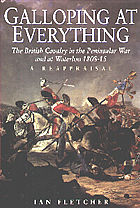Book
Review:
Galloping at Everything
Spellmount
By Ian Fletcher
 While
Britain's infantry of the Napoleonic Period won undying fame for
its courage and reliability, the same could not be said of that
country's cavalry.
While
Britain's infantry of the Napoleonic Period won undying fame for
its courage and reliability, the same could not be said of that
country's cavalry.
Flighty,
ill-disciplined and almost uncontrollable at times, history has
painted a bad picture of the mounted arm of the British army.
But
does the cavalry deserve such a reputation? Author and historian
Ian Fletcher thinks not and has investigated the issue in depth.
Galloping
at Everything: The British Cavalry in the Peninsular War and at
Waterloo 1808-15 from Spellmount, is Fletcher's defence of
the horsemen of Britain.
He
begins his work by looking at all aspects of Napoleonic cavalry
in Britain from the officers and men, their horses, organisation,
tactics, training, weapons, its day-to-day picquet duties and
how Spain and Portugal were unsuited to horses.
Fletcher
also makes it obvious that few cavalry officers were suited to
command and names only two as excellent - Henry Paget, later Lord
Uxbridge, and Gaspard Le Marchant. Stapleton Cotton gets a thumbs
up, but it is a bit of a back-handed compliment as the author
says Wellington liked him because he'd do as he was told.
Some
of the most interesting parts of the book come where he details
some of the exploits of other officers - such as Mad Jack Slade
- and they can be very amusing.
Having
explained the good and bad points of the horsemen, Fletcher then
goes through how they performed during the Peninsular War and
in certain key actions.
From
the overenthusiastic and disastrous charge of the 20th Light Dragoons
at Vimiero, the successes at Sahagun and Benavente, the controversy
that raged over who was to blame for the heavy losses at Campo
Mayor, and "the unluckiest" cavalry combat at Maguilla.
Fletcher
also examines the performances at Waterloo, including the crucial
charge of the Union Brigade and its unabandonned pursuit that
led to horrendous numbers of troopers being killed.
Despite
the major hiccups, however, Fletcher examines and explains that
Britain's cavalry performed very well overall and despite being
greatly outnumbered, the cavalry usually bested its French counterparts
in both small engagements and set battles.
Fletcher
also has the temerity to question the Duke of Wellington's ability
in handling his cavalry - as most of the great successes of that
arm came when the commander was not present!
Galloping
at Everything: The British Cavalry in the Peninsular War and at
Waterloo 1808-15 is yet another excellent work from Ian Fletcher
and should make people take another, more discerning look, at
how good Britain's cavalry was during those crucial campaigns.
If
you need to know anything about cavalry of the period then you
need look no further.
- Richard Moore
9/10